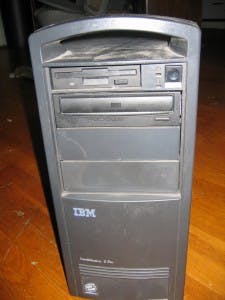2013 is the year of the repurchase program.
So far this year, major repurchase programs have been announced by some of Wall Street’s largest companies. Forget the great rotation – retail investors will find it hard to keep up with the pace of repurchases by the world’s largest publicly-traded companies.
Here are three companies with aggressive repurchase plans.

The company has authorization to repurchase as much as 5.6% of its total shares outstanding, a move which would cost the company $11.2 billion in cash at current share prices. This follows along in International Business Machines Corp. (NYSE:IBM)’s long history of using share repurchases to boost earnings per share and enrich existing shareholders with a larger portion of the company’s future income.
International Business Machines Corp. (NYSE:IBM) has paid out more than $150 billion to shareholders in the form of dividends and repurchases since 2000. During that period, share count fell by more than one-third. International Business Machines Corp. (NYSE:IBM) expects to continue the pace of rapid share repurchases, planning to ask the board for a bigger authorization in the third quarter of 2013.
Repurchases have created substantial shareholder value for investors while attracting classic value investors like Warren Buffett, who holds a sizable stake in International Business Machines Corp. (NYSE:IBM) for Berkshire Hathaway.
The Home Depot, Inc. (NYSE:HD) posted extraordinary fourth quarter net income, with growth coming in at 32% year-over-year. While the company plans to continue its expansion by opening new stores, the business is mature, with more than 1,000 Home Depots serving customers around the United States.
That leads The Home Depot, Inc. (NYSE:HD)’s management to focus on alternative methods of value creation for shareholders. After impressive fourth quarter results, The Home Depot, Inc. (NYSE:HD) delivered with the announcement of a $17 billion repurchase program, which would take one-sixth of its existing equity off the market if The Home Depot, Inc. (NYSE:HD) acquires shares at the current price.
The Home Depot, Inc. (NYSE:HD)’s buying spree is one of the most impressive of recent repurchase authorizations. The company hopes to slash shares outstanding and use the full amount of its $17 billion authorization by the end of fiscal year 2015.
Merck & Co., Inc. (NYSE:MRK) posted a poor quarter for earnings, then topped it off with lower full-year 2013 net income guidance of $3.45 to $3.55 per share, below the lower range of its prior guidance at $3.60. Merck & Co., Inc. (NYSE:MRK)’s guidance falls short of analysts’ consensus expectations of $3.62 per share.
In order to juice EPS at a time its drug pipeline is under question, Merck & Co., Inc. (NYSE:MRK) announced a huge, $15 billion share repurchase program. The company has no intentions to slow-roll its program, either, pledging to deploy some $7.5 billion in cash for shares just this year. That program could reduce Merck & Co., Inc. (NYSE:MRK)’s share count by some 11% if completed at the company’s current share price.
A big repurchase program by a pharmaceutical company suggests that it sees no better opportunities in R&D or acquisitions than it can find in its own stock. Merck & Co., Inc. (NYSE:MRK) lost patent-protected exclusivity on Singulair, a product which once led as a sales leader for the firm. New generic competition could weaken sales and margins going forward. The company trades at 13 times 2013 guidance, which is lower than the broad market. The S&P 500 trades at 14.5 times forward earnings expectations.
Bank on blue chip buybacks
In the long haul, big repurchases by household names lead to excellent value creation for shareholders, but only if repurchases are completed at a fair price. The last time repurchase interest peaked was in the third quarter of 2007, when companies repurchased nearly $180 billion of their own shares. In the fourth quarter of 2012, companies repurchased only $93.8 billion of their own stock.
If you like a company at the current price, you should only like it more as it repurchases its own shares.
Warren Buffett is the king of finding compounding machines in the form of buybacks. When he announced his position in IBM in 2011, he commented that he would prefer IBM to trade sideways or even fall for the next few years so the firm could use its cash flow to quietly repurchase shares at a price below their intrinsic value. So far, IBM seems to be doing just that.
Buybacks compound the effects of winners and losers alike. Those that have conviction in their undervalued holdings should only love them more as share counts dwindle.
The article 3 Blue Chips with Big Buyback Plans originally appeared on Fool.com is written by Jordan Wathen.
Copyright © 1995 – 2013 The Motley Fool, LLC. All rights reserved. The Motley Fool has a disclosure policy.